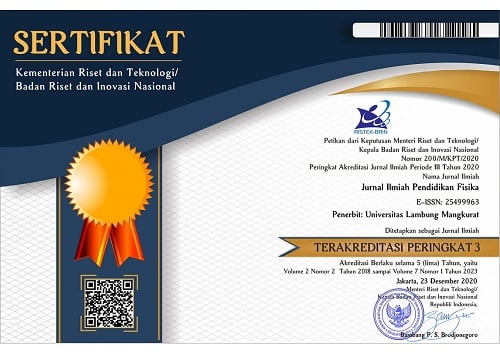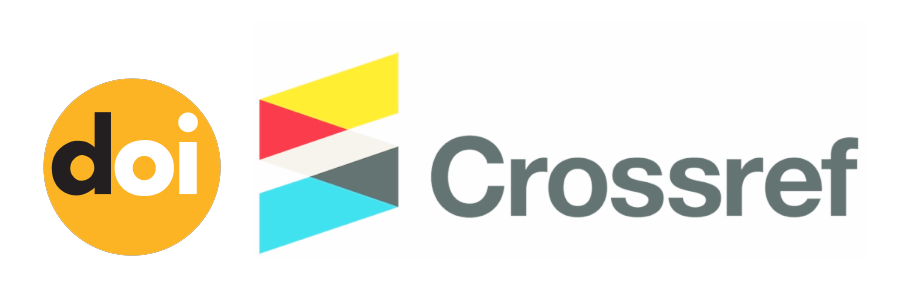Development of Student Worksheets on Dynamic Fluids Material to Improve Science Literacy
Abstract
Science literacy is one of the skills and competencies needed in physics learning. However, literacy skills need to be well-practised and have received little attention from schools. This research aims to develop science literacy-based student worksheets that are valid, practical, and effective and, therefore, appropriate for improving students' science literacy. This development study uses the ADDIE development model, which includes analysis, design, development, implementation, and evaluation. The study used a one-group pre-test and post-test method with 35 students from class XI MIPA 4 at SMAN 8 Banjarmasin. Data collection instruments included validation, lesson plan observation sheets, and learning outcome tests. Data analysis techniques involved calculating the average score on validation and practicality results, which were then analyzed descriptively based on achievement categorization. The effectiveness analysis used the N-Gain formula. The research results indicate that (1) The student worksheets and learning outcome tests are valid with excellent criteria; (2) The student worksheets and learning outcome tests are practical with excellent implementation criteria; (3) The student worksheets and learning outcome tests are effective, as indicated by an N-Gain science literacy score of 0.58, categorized as moderate. Based on these results, the science literacy-based physics worksheets on dynamic fluids material that were developed are declared feasible and can be used in the learning process to improve students' science literacy. The developed worksheets offer an alternative for enhancing students' science literacy.
Keywords
Full Text:
PDFReferences
Afiat, A. R. (2022). Peningkatan literasi sains melalui model problem based learning di sma integral ar-rohmah malang. Dinamika Sosial: Jurnal Pendidikan Ilmu Pengetahuan Sosial , 1(4), 426–437. https://doi.org/10.18860/dsjpips.v1i4.2509
Afnan, R., Munasir, M., Budiyanto, M., & Aulia, M. I. R. (2023). The role of scientific literacy instruments for measuring science problem solving ability. IJORER : International Journal of Recent Educational Research, 4(1), 45–58. https://doi.org/10.46245/ijorer.v4i1.271
Afsani, N., Daud, F., & Adnan. (2019). Pengembangan lembar kerja peserta didik (LKPD) berbasis literasi sains pada materi biologi. (Doctoral dissertation, Universitas Negeri Makassar).
Andriani, N., Saparini, S., & Akhsan, H. (2018). Kemampuan literasi sains fisika siswa smp kelas vii di sumatera selatan menggunakan kerangka PISA (Program for international student assesment). Berkala Ilmiah Pendidikan Fisika, 6(3), 278.
https://doi.org/10.20527/bipf.v6i3.5288
Ardianto, D., Firman, H., Permanasari, A., & Ramalis, T. R. (2019). What is science, technology, engineering, mathematics (STEM) literacy? Advances in Social Science, Education and Humanities Research, 253, 381–384.
Ariani, T., & Yolanda, Y. (2019). Effectiveness of physics teaching material based on contextual static fluid material. Physics Education Journal, 2(2), 70–81. http://jurnal.unipa.ac.id/index.php/kpej
Ashari, S. E., & Wisanti, W. (2020). Kelayakan teoretis lembar kegiatan peserta didik (lkpd) lumut berbasis literasi sains untuk melatihkan keterampilan berpikir kritis peserta didik. Berkala Ilmiah Pendidikan Biologi (BioEdu), 10(1), 95–101.
https://doi.org/10.26740/bioedu.v10n1.p95-101
Astutik, S., & Prahani, B. K. (2018). Developing teaching material for physics based on collaborative creativity learning (ccl) model to improve scientific creativity of junior high school students. Jurnal Penelitian Fisika Dan Aplikasinya (JPFA), 8(2), 91.
https://doi.org/10.26740/jpfa.v8n2.p91-105
Aswita, D., Nurmawati, Salamia, Sarah, S., Saputra, S., Kurniawan, E. S., Yoestara, M., Fazilla, S., Zulfikar, Putri, Z., Iqbal, M., & Ismail, N. M. (2022). Pendidikan literasi: Memenuhi kecakapan abad 21 (Pertama). K-Media.
Aulia, E. V, Poedjiastoeti, S., & Agustini, R. (2018). The effectiveness of guided inquiry-based learning material on students’ science literacy skills. Journal of Physics: Conference Series, 947, 012049. https://doi.org/10.1088/1742-6596/947/1/012049
Dewantara, D., Mahtari, S., Misbah, M., & Haryandi, S. (2019). Student responses in biology physics courses use worksheets based on scientific literacy. Prisma Sains: Jurnal Pengkajian Ilmu Dan Pembelajaran Matematika Dan IPA IKIP Mataram, 7(2), 192-197.
Dwinanda Wahab, M. N. N., Istyadji, M., & Putri, R. F. (2021). Pengembangan modul pembelajaran IPA SMP berbasis literasi sains pada materi sistem tata surya. Jurnal Ilmiah Pendidikan Fisika, 5(3), 278. https://doi.org/10.20527/jipf.v5i3.3675
Ergul, R., Simsekli, Y., Calis, S., Ozdilek, Z., Gocmencelebi, S., & Sanli, M. (2011). The effect of inquiry-based science teaching on elementary school students’ science process skills and science attitudes. Bulgarian Journal of Science and Education Policy (BJSEP), 5(1), 48–67.
Hadiningrum, K., Muldiani, R. F., & Pratama, D. (2023). Improving understanding of the concept of the effect of temperature on fluid flow characteristics through experimental methods for engineering students. Jurnal Geliga Sains: Jurnal Pendidikan Fisika, 10(2), 144–153.
https://doi.org/10.31258/jgs.10.2.144-153
Hake, R. R. (1999). Analyzing change/gain scores. https://doi.org/10.24036/ekj.v1.i1.a10
Hartini, S., Latifah, R., Salam, M. A., & Misbah. (2019). Developing of physics teaching material based on scientific literacy. Journal of Physics: Conference Series, 1171(1), 1–7. https://doi.org/10.1088/1742-6596/1171/1/012021
He, L., Chen, Y., Xiong, X., Zou, X., & Lai, K. (2021). Does science literacy guarantee resistance to health rumors? The moderating effect of self-efficacy of science literacy in the relationship between science literacy and rumor belief. International Journal of Environmental Research and Public Health, 18(5), 1–10. https://doi.org/10.3390/ijerph18052243
Jufrida, J., Basuki, F. R., Kurniawan, W., Pangestu, M. D., & Fitaloka, O. (2019). Scientific literacy and science learning achievement at junior high school. International Journal of Evaluation and Research in Education, 8(4), 630–636. https://doi.org/10.11591/ijere.v8i4.20312
Juliarti, E. (2022). Development of canva-based digital teaching materials to train students’ understanding of dynamic fluid concepts. International Journal of E-Learning and Multimedia, 1(2), 73–77.
Khasanah, N. U., Arnentis, & Sayuti, I. (2021). Developing science-based literacy student worksheets of respiration system for senior high school class xi students. JOM FKIP-UR, 8(2), 1–10.
Lailis, A. N., Arifuddin, M., & M, A. S. (2021). Pengembangan bahan ajar suhu dan kalor berbasis multimodel untuk melatihkan keterampilan proses sains dan hasil belajar. Jurnal Ilmiah Pendidikan Fisika, 4(3), 126. https://doi.org/10.20527/jipf.v4i3.2059
Lestari, P. C., Miriam, S., & Misbah, M. (2021). Science literacy-based sound wave e-worksheet: Validity aspects. Journal of Physics: Conference Series, 2104(1), 012010. https://doi.org/10.1088/1742-
/2104/1/012010
Lusiana, R., & Andari, T. (2022). Students’ creative thinking ability in solving linear equation system problems based on brain domination. Jurnal Math Educator Nusantara: Wahana Publikasi Karya Tulis Ilmiah Di Bidang Pendidikan Matematika, 8(1), 62–74. https://doi.org/10.29407/jmen.v8i1.17493
Muzijah, R., Wati, M., & Mahtari, S. (2020). Pengembangan e-modul menggunakan aplikasi exe-learning untuk melatih literasi sains. Jurnal Ilmiah Pendidikan Fisika, 4(2), 89. https://doi.org/10.20527/jipf.v4i2.2056
Nurcahyani, D., Yuberti, Irwandani, Rahmayanti, H., Ichsan, I. Z., & Rahman, M. M. (2021). Ethnoscience learning on science literacy of physics material to support environment: A meta-analysis research. Journal of Physics: Conference Series, 1796, 8. https://doi.org/10.1088/1742-6596/1796/1/012094
Odden, T. O. B., Lockwood, E., & Caballero, M. D. (2019). Physics computational literacy: An exploratory case study using computational essays. Physical Review Physics Education Research, 15(2), 1–22. https://doi.org/10.1103/PhysRevPhysEducRes.15.020152
Odja, A. H., & Payu, C. S. (2014). Analisis kemampuan awal literasi sains siswa pada konsep IPA. Prosiding Seminar Nasional Kimia, 40–47.
Pertiwi, U. D., Atanti, R. D., & Ismawati, R. (2018). Pentingnya literasi sains pada pembelajaran ipa smp abad 21. Indonesian Journal of Naturan Science Education, 1(1), 24–29.
Prasetya, C., Gani, A., & Sulastri, S. (2020). Pengembangan lembar kerja peserta didik berbasis inkuiri terbimbing pada materi hidrolisis garam untuk meningkatkan literasi sains. Jurnal Pendidikan Sains Indonesia, 7(1), 34–41.
Prastika, M. D., Wati, M., & Suyidno, S. (2019). The effectiveness of problem-based learning in improving students scientific literacy skills and scientific attitudes. Berkala Ilmiah Pendidikan Fisika, 7(3), 194. https://doi.org/10.20527/bipf.v7i3.7027
Rahayu, S. (2017). Mengoptimalkan aspek literasi dalam pembelajaran kimia abad 21. Prosiding Seminar Nasional Kimia UNY 2017, 319–324.
Rahmita, F. I., & Wasis, W. (2022). Remediasi miskonsepsi dengan lkpd model guided inquiry learning berbantuan phet simulation pada materi fluida dinamis. Jurnal Ilmiah Pendidikan Fisika, 6(2), 302. https://doi.org/10.20527/jipf.v6i2.5276
Sugiyono. (2019). Metode penelitian pendidikan (Kuantitatif, kualitatif, kombinasi, R&D dan penelitian pendidikan). Alfabeta.
Ummah, M., Rusilowati, A., & Yulianti, I. (2018). Pengembangan bahan ajar berbasis literasi sains materi gelombang cahaya. UPEJ Unnes Physics Education Journal, 7(3).
Vieira, R. M., & Tenreiro-Vieira, C. (2016). Fostering scientific literacy and critical thinking in elementary science education. International Journal of science and mathematics education, 14(4), 659-680.
Widoyoko, E. P. (2016). Evaluasi program pembelajaran. Pustaka Pelajar.
Zaidah, A., & Pransisca, M. A. (2020). Requirement analysis on the development of scientific based on modules empowers student’s critical thinking skills. NUSRA: Jurnal Penelitian Dan Ilmu Pendidikan, 1(1), 10–15.
DOI: https://doi.org/10.20527/jipf.v8i3.10073
Refbacks
- There are currently no refbacks.
Indexed by: Jurnal Ilmiah Pendidikan Fisika is licensed under a creative commons attribution-share alike 4.0 international license
Statistics Counter |
















